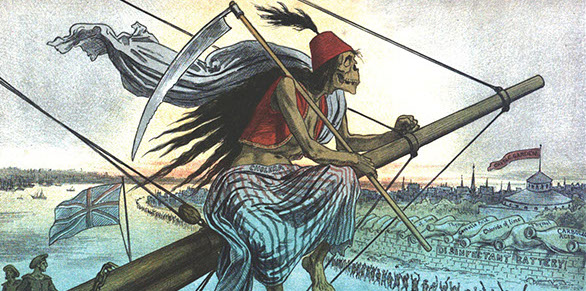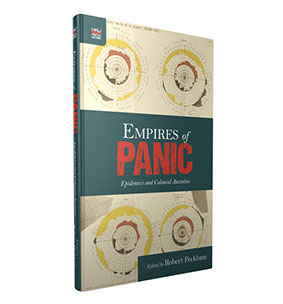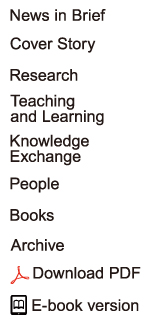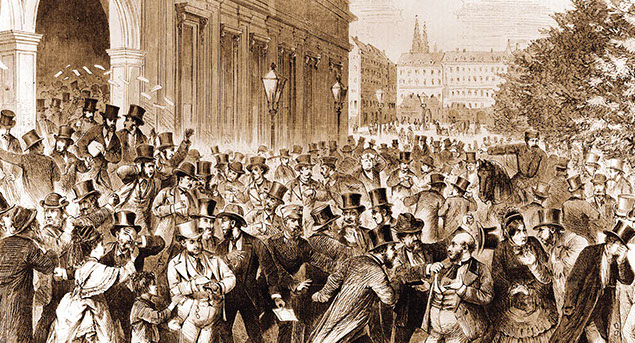Epidemics,
Panic And History
Social and political contexts are crucial for understanding epidemics, argues Dr Robert Peckham, who has been drawing on lessons from history to shed new light on panic and disease control.
Hong Kong is more familiar with epidemics than most cities, having lived through SARS and avian influenza in recent years. What better place, then, to consider the far-reaching impacts of epidemics on society.
Dr Robert Peckham, Founder and Co-Director of HKU’s Centre for the Humanities and Medicine which recently marked its fifth anniversary, is applying a fresh approach to epidemics and their effects. His new edited book, Empires of Panic: Epidemics and Colonial Anxieties, explores the different kinds of panic produced by outbreaks of infectious disease.
“Managing panic is integral to disease control,” he said. “An epidemic poses a multi-faceted security challenge: Health concerns can easily become entangled with anxieties about social order and economic stability. There is a loop-back effect as epidemics produce panic, triggering an emergency response that induces further panic that may drive infection.”
Outbreaks of bubonic plague in late 19th-century India and Hong Kong caused widespread panic. Draconian measures imposed by the panicky colonial state – such as enforced isolation and quarantine – served to exacerbate panic in the local population, which then spilled over into violent protest that called forth even harsher interventions by the state.
“In Hong Kong, the colonial administration was forced to back down. In the end, it couldn’t control cross-border movements,” Dr Peckham said.

![]() Health concerns can easily become entangled with anxieties about social order and economic stability. There is a loop-back effect as epidemics produce panic, triggering an emergency response that induces further panic that may drive infection.
Health concerns can easily become entangled with anxieties about social order and economic stability. There is a loop-back effect as epidemics produce panic, triggering an emergency response that induces further panic that may drive infection. ![]()
Dr Robert Peckham
An agent of change
The experience of epidemics led Europeans to rethink how they organised their colonies. Initially, they had sought to distance themselves from the threat of disease at large by establishing enclaves. Legislation was passed in Hong Kong at the beginning of the 20th century, for example, that reserved the Peak District exclusively for colonials. It soon became apparent, however, that exclusionary policies would not work.
Epidemics provided a stimulus for infrastructural projects designed to sanitise the city, including the construction of waterworks and a system of reservoirs, as well as new types of housing. More recently, SARS resulted in far-reaching institutional changes, from the provision of hand-sanitizers at the entrances of many public buildings, to the arrangement of the city’s public services, including hospital operations and morgue facilities.
“In this sense,” Dr Peckham said, “panic can be harnessed by the government to effect change. It can serve, often inadvertently, as a tool for pushing through policies that might have been difficult or impossible to implement at a time of non-crisis.”
Curiously, some diseases have sparked panic while others have not. In India, the plague is estimated to have killed about as many people as the influenza of 1918–1919, but there was no widespread panic with the latter. Dr Peckham pointed out that responses can be shaped by the nature of the disease and its particular cultural associations in a given community, as well as government action (or inaction). Panic may also be produced by the spectre of disease, even when there are no cases of infection.
“Last year’s Ebola outbreak in West Africa provides useful insights into why history matters,” he said. Political, social and cultural contexts were crucial in determining how the epidemic played out. Moreover, Ebola erupted at a moment when Europe was dealing with two other concurrent crises: one economic, the other over mass migration from Sub-Sahara Africa. Fears about the spread of disease coalesced with these other anxieties, each fuelling the other.

Illustration by Fritz Graetz showing the cholera personified as a Turkish immigrant arriving in New York, Puck, July 18, 1883.
Panics not panic
Dr Peckham suggested that it would be more helpful if ‘panics’ were referred to in the plural, rather than a singular panic. Epidemics are compounded events that involve many different kinds of panic that pivot on fears about health, the economy, political stability, and social coherence.
“MERS (Middle East Respiratory Syndrome) in Korea provides the latest example of a situation where an epidemic became intertwined with anxieties about a faltering economy and public concerns about political transparency and government accountability. Our research focusses on the entanglement of these panics and their consequences,” he said. He explores these themes further in his forthcoming book, Epidemics in Modern Asia, to be published next year.
On a related note, Dr Peckham is also interested in how military surveillance technologies have been co-opted for epidemic control. While unmanned aerial vehicles or drones are being used for combat, they are also being deployed for monitoring potential epidemics. Viral activity in emerging disease ‘hot-spots’ is increasingly tracked using military-style intelligence-gathering techniques that aim to anticipate spill-over events.
“What happens,” he asked, “when we import a military operational modality into public health and implicitly equate biological phenomena with an insurgent terror?” Microorganisms responsible for infectious disease exist as part of complex and little understood ecologies. The military model, he argued, diminished this complexity and created a false expectation that pathogenic threats could be blitzed.

Meanwhile, Dr Peckham and the members of the Centre will continue to build a bridge between the humanities and medicine. “Our aim is to develop a novel transdisciplinary approach to infectious disease, in order to better understand how biological and social ecologies interact,” he said. He suggested the humanities could provide critical insights into the social, cultural and political dimensions of epidemics and in so doing, help to forge a more integrated response to future threats.
Empires of Panic: Epidemics and Colonial Anxieties is published by Hong Kong University Press. Epidemics in Modern Asia will be published by Cambridge University Press in 2016.
Next



